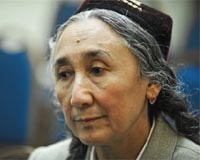| . |  |
. |
Beijing (AFP) Sept 27, 2009 China on Sunday denied charges that migration by the dominant Han ethnic group threatened indigenous cultures in minority regions and said its system for ruling such regions would not change. The comments by top officials from the State Ethnic Affairs Commission came during a press conference during which they fielded questions on the causes and impact of recent deadly unrest in Xinjiang and Tibet. "There is no such thing as problems being created by Han migration to Tibet or other minority regions," Wu Shimin, vice-chairman of the commission, told reporters. "Some people say the Han population in Tibet is increasing greatly and fear that the local population will be diluted. This is not true." Opponents of Chinese rule of the northwestern Xinjiang region and the Himalayan enclave of Tibet complain of an officially encouraged influx of Han that they say threatens to eclipse local languages, religions and cultures. They say increasing Han dominance also leaves Xinjiang's Muslim Uighurs and Buddhist Tibetans second-class citizens in their own lands. Long-simmering discontent in the two regions flared into deadly violence recently, with anti-Chinese riots breaking out in Tibet in March 2008 while riots by Uighurs erupted in the Xinjiang capital Urumqi in July this year. China would not rethink its system of "autonomous" regions for its larger ethnic groups, such as in Xinjiang and Tibet, despite the apparent widespread discontent in those areas, commission head Yang Jing said. "In Xinjiang, as well as in other ethnic regions in other parts of China, the government's overall ethnic policy and approach will stay unchanged," said Yang, minister of the ethnic affairs commission. However, he said policies may be "adjusted" as needed, but gave no specifics. Many members of ethnic minority groups dismiss the "autonomous" label as political window-dressing, complaining that Xinjiang, Tibet and other such regions remain firmly under Chinese Communist Party control.
earlier related report The bill passed by Xinjiang's standing committee bans people in the region from using the Internet in any way that undermines national unity, incites ethnic separatism or harms social stability, the China News Service reported. The bill requires Xinjiang's Internet service providers and network operators to set up monitoring systems -- or strengthen existing ones -- and report anyone who breaks the law, the report said. The bill did not specify what punishment offenders would face, but its apparent aim is to allow authorities to arrest individuals behind e-mails, web postings and sharing of media within the region that they deem to be a threat. "The introduction of the 'Information Promotion Bill' is timely and necessary," the report quoted the bill as saying. "It ensures Internet criminals can be quickly and effectively controlled in the future." Several media sites and social networking sites such as Facebook, Twitter and YouTube are already blocked in China and the country's web censors often do not allow search engines to display results for politically sensitive topics. The bill said terrorists, separatists and religious extremists used the Internet, telephones and mobile text messages to spread rumours and hatred as violence erupted in the region's capital Urumqi on July 5, the report said. In one of the biggest known Internet shutdowns anywhere, authorities quickly cut off Internet access in the region and disabled text messages, restricting the flow of information going in and out of Xinjiang. Despite these efforts exile communities used video-sharing websites such as YouTube to release images of the unrest hours before these appeared on China's state-controlled media. Members of the ethnic Uighur minority -- most of whom are Muslims -- went on a rampage July in attacks directed mainly at members of China's dominant Han ethnic group. The riots were the worst ethnic violence in China in decades, leaving 197 people dead, most of them Han, according to the government. The bill was announced in the lead up to the 60th anniversary of what China calls the "liberation" of Xinjiang. Many of Xinjiang's Uighurs, a central Asian people with vast religious, cultural and linguistic differences from the Han, accuse China of decades of oppression and complain of unwanted Han migration to the vast desert region. China, however, blames the seething unrest in Xinjiang on "separatists" but has provided no evidence. Share This Article With Planet Earth
Related Links News From Across The Stans
 Taiwan will not allow Uighur leader Kadeer to visit: official
Taiwan will not allow Uighur leader Kadeer to visit: officialTaipei (AFP) Sept 25, 2009 Taiwan said Friday it will bar a visit by exiled Uighur leader Rebiya Kadeer while indirectly linking her organisation to terrorism, a move observers predicted will please China. "We have decided not to allow Kadeer entry considering that her visit could affect national interest and social order," Interior Minister Jiang Yi-huah said, according to an official with the Government Information ... read more |
|
| The content herein, unless otherwise known to be public domain, are Copyright 1995-2009 - SpaceDaily. AFP and UPI Wire Stories are copyright Agence France-Presse and United Press International. ESA Portal Reports are copyright European Space Agency. All NASA sourced material is public domain. Additional copyrights may apply in whole or part to other bona fide parties. Advertising does not imply endorsement,agreement or approval of any opinions, statements or information provided by SpaceDaily on any Web page published or hosted by SpaceDaily. Privacy Statement |